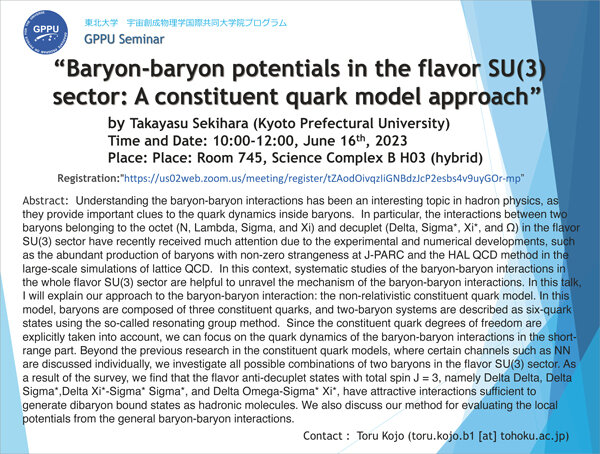お知らせ

- トップ
- お知らせ
GP-PUセミナー「Baryon-baryon potentials in the flavor SU(3) sector: A constituent quark model approach」開催のご案内
6月16日(金)、Takayasu Sekihara氏 (Kyoto prefectural University)による宇宙創成物理学国際共同大学院(GP-PU)セミナー「Baryon-baryon potentials in the flavor SU(3) sector: A constituent quark model approach」を開催いたします。
■日 時
2023年6月16日(金)10:00-12:00
■セミナー題目
"Baryon-baryon potentials in the flavor SU(3) sector: A constituent quark model approach"
by Takayasu Sekihara (Kyoto prefectural University)
■開催形式
対面×オンライン(Zoom)併用
[対面会場] 理学研究科合同B棟745号室 (キャンパスマップ「H-03」の建物です。)
■参加登録
参加者は事前に下記URLで参加登録が必要です
https://us02web.zoom.us/meeting/register/tZAodOivqzIiGNBdzJcP2esbs4v9uyGOr-mp
■概要
Understanding the baryon-baryon interactions has been an interesting topic in hadron physics, as they provide important clues to the quark dynamics inside baryons. In particular, the interactions between two baryons belonging to the octet (N, Lambda, Sigma, and Xi) and decuplet (Delta, Sigma*, Xi*, and Ω) in the flavor SU(3) sector have recently received much attention due to the experimental and numerical developments, such as the abundant production of baryons with non-zero strangeness at J-PARC and the HAL QCD method in the large-scale simulations of lattice QCD. In this context, systematic studies of the baryon-baryon interactions in the whole flavor SU(3) sector are helpful to unravel the mechanism of the baryon-baryon interactions. In this talk, I will explain our approach to the baryon-baryon interaction: the non-relativistic constituent quark model. In this model, baryons are composed of three constituent quarks, and two-baryon systems are described as six-quark states using the so-called resonating group method. Since the constituent quark degrees of freedom are explicitly taken into account, we can focus on the quark dynamics of the baryon-baryon interactions in the short-range part. Beyond the previous research in the constituent quark models, where certain channels such as NN are discussed individually, we investigate all possible combinations of two baryons in the flavor SU(3) sector. As a result of the survey, we find that the flavor anti-decuplet states with total spin J = 3, namely Delta Delta, Delta Sigma*,Delta Xi*-Sigma* Sigma*, and Delta Omega-Sigma* Xi*, have attractive interactions sufficient to generate dibaryon bound states as hadronic molecules. We also discuss our method for evaluating the local potentials from the general baryon-baryon interactions.
■Point
GASP 1
■お問合せ
物理学専攻(GP-PU) 古城 徹
E-mail: toru.kojo.b1[at]tohoku.ac.jp
([at]を@に置き換えてください)

Posted on:2023年6月 1日